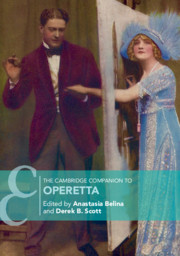Book contents
- The Cambridge Companion to Operetta
- Cambridge Companions to Music
- The Cambridge Companion to Operetta
- Copyright page
- Contents
- Illustrations
- Tables
- Music Examples
- Notes on Contributors
- Chronology, 1855–1950
- Introduction
- Part I Early Centres of Operetta
- Part II The Global Expansion of Operetta
- 6 Going Global: The International Spread of Viennese Silver-Age Operetta
- 7 Spain and Zarzuela
- 8 Camping along the American Operetta Divide (on the Road to the Musical Play)
- 9 Operetta in Russia and the USSR
- 10 Operetta in the Nordic Countries (1850–1970)
- 11 Operetta in Greece
- Part III Operetta since 1900
- Select Bibliography
- Index
- References
11 - Operetta in Greece
from Part II - The Global Expansion of Operetta
Published online by Cambridge University Press: 14 November 2019
- The Cambridge Companion to Operetta
- Cambridge Companions to Music
- The Cambridge Companion to Operetta
- Copyright page
- Contents
- Illustrations
- Tables
- Music Examples
- Notes on Contributors
- Chronology, 1855–1950
- Introduction
- Part I Early Centres of Operetta
- Part II The Global Expansion of Operetta
- 6 Going Global: The International Spread of Viennese Silver-Age Operetta
- 7 Spain and Zarzuela
- 8 Camping along the American Operetta Divide (on the Road to the Musical Play)
- 9 Operetta in Russia and the USSR
- 10 Operetta in the Nordic Countries (1850–1970)
- 11 Operetta in Greece
- Part III Operetta since 1900
- Select Bibliography
- Index
- References
Summary
Light musical theatre first appeared in Greece during the second half of the nineteenth century in the form of French operetta and vaudeville, bringing new morals that scandalized the nouveau-bourgeois society of Athens and divided the public into ‘Europeanists’ and ‘conservatives’. At the dawn of the twentieth century, Viennese operetta introduced light musical theatre, which thrilled Athenian audiences and represented the ‘imperial dream’ of the inhabitants of a small country on the fringes of Europe. Operetta inspired the creation of Greek musical theatre companies from the early twentieth century and became popular for tours of the south-eastern Mediterranean. This phase ended with the production of plays and performances of Greek operetta during the interwar period. This chapter offers a multi-sided approach to the expansion of operetta in Greek-speaking areas, which brought with it a renovation of the Modern Greek theatrical stage and life, invigorating it with a new repertoire and forming a new theatrical tradition. New operettas provided the frame for Greece’s twofold musical identity: Western and Oriental. Operetta served as a social melting pot between ‘high’ and ‘popular’ musical creation and was the source of many well-known songs
Keywords
- Type
- Chapter
- Information
- The Cambridge Companion to Operetta , pp. 167 - 186Publisher: Cambridge University PressPrint publication year: 2019

